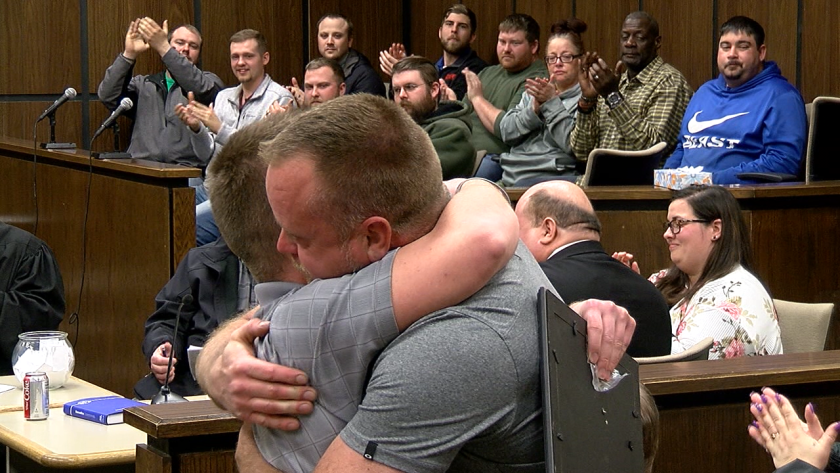Editor's note: This is the fourth of four stories on the mental health challenges straining North Dakota's criminal justice system. Read the rest of the "System under stress" series here: Part 1 , Part 2 and Part 3 .
FARGO — North Dakota has used drug courts for more than 20 years to handle the most difficult addiction cases and has found success in preventing recidivism among roughly 60% of participants, officials said.
Some states are expanding the intensive team approach that has long been used to handle drug-addicted defendants to include mentally ill defendants.
Some North Dakota officials have looked at mental health courts in South Dakota as an example, but so far no jurisdictions in North Dakota are working to develop them.
Even with established drug courts, North Dakota jails and prisons are searching for alternatives to incarceration for those who commit crimes resulting from mental illness or substance use disorders.
ADVERTISEMENT
Three judicial districts in the state — North Central, South Central and East Central, which includes Cass County — have pilot projects allowing some low-risk offenders to seek treatment instead of remaining in custody while awaiting trial.
The goal of the pretrial diversion program is to keep defendants from reoffending while released on bond and to reduce recidivism, the problem of people with untreated mental illnesses or addictions cycling in and out of jail.
A study of the three pilot programs found that those in the pretrial services program showed “statistically significant” likelihood to avoid jail, said Patrick Bohn, director of parole and probation for the North Dakota Department of Corrections and Rehabilitation.
The findings will be presented to the governor and Legislature to see if they want to expand the program, he said.
Those in jail for lengthy pretrial periods are more likely to lose their jobs and access to treatment, Bohn said. “It kind of drives you deeper into the ditch,” he said.
Drug courts, of which there are seven adult and six juvenile courts around the state, take a collaborative approach. Participants work with a team including a judge, prosecutor, defense lawyer, probation officer, law enforcement officer, treatment provider and coordinator.
Participants agree to a yearlong course of treatment and guidance. They must work, go to school or perform community service and attend weekly sessions with the court team.
Before each meeting, the teams meet to discuss the participants' compliance and treatment progress, then the team meets with a cohort of participants to discuss their goals for the coming week.
ADVERTISEMENT
“These are high-risk, high-needs people,” said Marilyn Moe, drug court program manager for the North Dakota Supreme Court. “It’s pretty intense. They have to go to court every week. Treatment is a huge part of the process.”
Each adult drug court can handle about 30 participants, and juvenile courts can handle 15 participants at a time, she said. Most dealing with substance use disorders also have other mental illnesses, Moe said.
“Most of our people are what we call dual diagnosis,” she said.
Moe and John Gourde, drug court program manager for the North Dakota Department of Corrections and Rehabilitation, both estimate success rates at about 60% of participants. The biggest obstacle to expanding into mental health courts has been the need for additional resources, Moe said.
“Our human resources are struggling to provide substance use (support), let alone mental health,” she said.
Also, Moe added, “A study would have to be done to see what the numbers would be,” both in terms of the need and resources available, including judges. “Everything needs a judge when you do that.”
The judicial system already has concerns about the caseloads for judges, and there is no effort to add mental health courts, Bohn said.
ADVERTISEMENT

South Dakota turned to mental health courts to deal with the problem of people with untreated or poorly managed mental illness repeatedly cycling into the criminal justice system, said Noreen Plumage, director of Problem Solving Courts for the South Dakota Unified Judicial System.
“They’re absolutely phenomenal,” she said. As with drug courts, however, mental health courts only work when they can work closely with treatment services. That’s why the mental health courts have only been established in Sioux Falls and Rapid City, South Dakota’s largest cities, Plumage said.
“They’re designed to intervene,” keeping participants in treatment and on their medications as well as in a stable living situation, she said. “We use the leverage of the court” with the possibility of court sanctions for noncompliance.
Each mental health court handles 20 to 35 defendants at a time and works with them for extended periods — 18 months, 24 months, even up to 36 months, Plumage said.
“We’re trying to effect change,” she said. “That doesn’t happen in 30 days.”
Those who appear before the mental health courts present the biggest challenges, with those most prone to causing repeated problems in society requiring intervention by law enforcement, she said.
“They’ve got a whole bunch of problems, then they get involved with the law,” Plumage said.
ADVERTISEMENT
Not all participants in mental health court complete their program, but most benefit from the treatment and support they receive, said Circuit Judge Jeffrey Connelly, who presides over a mental health court in Rapid City.
“I think they were all significantly better off even if they didn’t complete the program,” he said. They were better able to manage their addictions or handle everyday living.
The mental health court in Rapid City, established almost three years ago, had its first three graduates in July. “It was life-changing for them,” he said.
Failure could result in being sentenced to the penitentiary, so participants are motivated to improve. “It is intense probation,” with a case manager helping the participant obtain services, access to housing and employment and to stay on their medications, keeping them from running afoul of the law, he said
“We’re trying to get people off probation and not send them to prison,” Connelly added.
Although labor-intensive, the program is less costly than incarceration — especially if all of the costs associated with severe and persistent mental illness are included, such as pain and suffering and harm to others, he said.
In Fargo and Bismarck, officers assigned to those on probation or parole with severe mental illness have been available since 2015, Gourde said.
In Cass County, the officer assigned to handle mental illness cases has up to 35 people to monitor, to ensure that they are taking their medications and receiving treatments, among other things, in an effort to keep them stable and prevent them from reoffending, Gourde said.
ADVERTISEMENT
“I would say that it’s worked well,” he said. “This is a population that traditionally struggles,” leading to cycling in and out of the criminal justice system. “We are satisfied with our outcomes. We are getting better results.”
As with drug court participants, those under supervision are connected to services. Those supervised under the program go through treatment and are employed and have stable housing.
Last year, 69% of those supervised remained in substantial compliance and 63% completed their supervision, performing better than those on probation or parole overall, Gourde said. “We’re very satisfied," he added.
Success rates under the supervision program and drug court fluctuate, varying year to year and between jurisdictions, he said.
“2020 was a tough year,” Gourde added. The coronavirus pandemic made it more difficult to access services, he said.

Funding has been provided to add 10 parole and probation officers to reduce caseloads, which now typically range from 75 to 80, Bohn said. Officers are forced to be generalists and supervise a large number of people.
ADVERTISEMENT
“How do you do that in Watford City?” he said, referring to specialty supervision for severe mental illness. “How do you do that in Beulah,” or any area of rural North Dakota?
Ultimately, the best solution is to work to build capacity and quality of behavioral health services in communities, Bohn said. Doing that can help prevent many problems that the court and corrections systems must try to solve once they become severe and ingrained.
“That’s a big piece,” he said. “That’s a huge piece.”









